- Home
- Nicholas Sparks
The Wish Page 17
The Wish Read online
Page 17
“Perfect,” she said.
“I have a surprise,” he added. “I hope you won’t mind.”
“I love surprises.”
“Give me a minute, okay?”
He vanished into the back again, returning with a small portable speaker and candles tucked beneath his arm, along with two glasses filled with a creamy liquid. She assumed it was a smoothie, but as he drew near, she realized she was mistaken.
“Eggnog?”
“I thought it seemed appropriate.”
He handed her a glass and she took a sip, hoping her stomach wouldn’t sour. Thankfully, it didn’t, nor was there much of an aftertaste. She took another drink, realizing how hungry she was.
“There’s plenty in the back for refills,” he said. He took a sip as well, then set his glass on a low wooden pedestal. He put the speaker next to the glass and pulled his phone from his pocket. A few seconds later, she was listening to Mariah Carey singing “All I Want for Christmas Is You,” the volume low. He lit the candles, then went over and turned off most of the lights, leaving only the ones near the rear of the gallery illuminated.
He took a seat on the pedestal.
“My story really got to you, huh?” she asked.
“I told Abigail all about it when we FaceTimed last night. She suggested that if we were going to decorate the tree, I might as well try to re-create parts of your Ocracoke Christmas as well. She helped me with the playlist, and I picked up the eggnog and candles when I grabbed the extension cord.”
Maggie smiled as she removed her gloves, but still chilled, she decided to keep her jacket and scarf on. “I’m not sure I’m going to have enough energy to help you with the tree,” she confessed.
“That’s fine. You can direct, like Bryce’s mom did. Unless you’d like to try again tomorrow…”
“Not tomorrow. Let’s do it now.” She swallowed another mouthful of eggnog. “I wonder when people started putting up Christmas trees in the first place.”
“I’m pretty sure it was the mid- to late sixteenth century in what’s now Germany. For a long time, it was regarded as a Protestant custom. The first tree wasn’t displayed at the Vatican until 1982.”
“And you just happened to know that off the top of your head?”
“I did a report on it when I was in high school.”
“I can’t remember anything from the reports I did in high school.”
“Even Thurgood Marshall?”
“Even him. And just so you know, even though my family was Catholic, we had Christmas trees growing up.”
“Don’t blame the messenger,” he teased. “You ready to do some directing while I get to work?”
“Only if you’re sure you don’t mind.”
“Are you kidding? This is great. I don’t have a tree in my apartment, so this is the only chance I’ll have this year.”
He found the box, freed the lights from their plastic packaging, then plugged in the extension cord. Like Bryce long ago, he moved the tree out from the corner to string the lights, making adjustments as Maggie suggested. The silk ribbons came next, then finally a large matching bow, which he placed on top in lieu of a star. He finished by dispersing the ornaments throughout the tree, following Maggie’s instructions. After scooting it back into place, he retreated to Maggie’s side, the two of them evaluating it.
“Good?” he asked.
“It’s perfect,” she said.
Mark continued to stare at the tree before finally reaching for his phone. He took a series of pictures, then began tapping the screen.
“Abigail?”
She watched him actually blush. “She wanted to see the tree as soon as it was finished. I’m not sure she trusted me to do a good job. I’m sending it to my parents, too.”
“Did you hear from your folks today?”
“They texted some photos from Nazareth and the Sea of Galilee. You’ve been to Israel, right?”
“It’s an incredible country. When I visited, I kept thinking to myself that I might be following in Christ’s footsteps. Literally, I mean.”
“What were you photographing?”
“Tel Megiddo, the Qumran cliffs, and a few other archeology digs. I was there for about a week, and I’ve always wanted to go back but there were too many other places to see for the first time.”
Mark leaned forward, his elbows on his knees as he stared up at her. “If I could visit one place in the world, what do you think that should be?” Light flickered in his eyes, making him appear almost childlike.
“A lot of people have asked me that question, but there’s no single answer. It depends on where you are in life.”
“I’m not sure I follow.”
“If you’ve been stressed and working a zillion hours for months, maybe the best place to go would be a tropical beach somewhere. If you’re in search of the meaning of life, maybe go hiking in Bhutan or visit Machu Picchu or attend mass in St. Peter’s Basilica. Or maybe you just want to see animals, so you travel to Botswana or northern Canada. I can say that I see all those places differently—and I photographed them differently—based partly on my own life experiences at the time.”
“I get that,” he said. “Or at least I think I do.”
“Where would you want to go? If you could only see one place?”
He reached for his eggnog and took a sip. “I like your Botswana idea. I’d love to go on safari, see the wild animals. I might even be convinced to bring a camera, though I’d stick with the automatic setting.”
“I can give you a few photography pointers if you’d like. And who knows? Maybe you’ll have your own gallery, too, one day.”
He laughed. “Not a chance.”
“Going on safari is a good choice. Maybe think about it for your honeymoon?”
“I hear it’s kind of expensive. But I’m confident we’ll get there one day. Where there’s a will, there’s a way and all that.”
“Like your parents and their trip to Israel?”
“Exactly,” he said.
She leaned back in her chair, finally beginning to feel closer to normal again. She wasn’t yet warm enough to take off her jacket, but the bone-deep chill had passed. “I know your dad is a pastor, but I don’t think I’ve ever asked about your mom.”
“She’s a child psychologist. She and my dad met when they were both getting their PhDs at Indiana.”
“Does she teach or practice?”
“She’s done a bit of both in the past, but now she mainly practices. She also assists the police when necessary. She’s an on-call specialist if there’s a child in trouble, and because she often serves as an expert witness, she testifies in court quite a bit.”
“She sounds smart. And very busy.”
“She is.”
Though it took some effort, Maggie tucked her leg up, trying to get more comfortable. “I’m guessing that in your house, there wasn’t a lot of shouting when emotions were high. Since your dad’s a pastor and your mom is a psychologist?”
“Never,” he agreed. “I don’t think I’ve ever heard either of them raise their voice. Unless they were cheering for me in hockey or baseball, I mean. They prefer talking things out, which sounds great, but it can also be frustrating. It’s no fun to be the only one shouting.”
“I can’t imagine that you ever shouted.”
“I didn’t do it much, but when I did, they’d ask me to lower the volume so we could have a reasonable discussion, or they’d tell me to go to my room until I calmed down, after which we’d have the reasonable discussion anyway. It didn’t take long before I understood that shouting doesn’t work.”
“How long have your parents been married?”
“Thirty-one years,” he said.
She did the mental calculation. “They’re a little older, then, right? Since they met when they were getting their PhDs?”
“They’ll both turn sixty next year. My mom and dad sometimes talk about retiring, but I’m not sure that day will ever come. They bot
h love what they do too much.”
She recalled her earlier reflections about Morgan. “Did you ever wish you had siblings?”
“Not until recently,” he said. “Being an only child was all I knew. I think my parents wanted more kids, but it just didn’t work out. And being an only child sometimes has its advantages. It’s not like I had to make compromises when it came to what movie to see, or what to ride first at Disney World. But now that I’m with Abigail, and I see how close she is to her siblings, I sometimes wonder what it would have been like.”
After Mark trailed off, neither of them said anything for a short spell. She had the sense that he wanted to hear more about her time in Ocracoke, but realized she wasn’t quite ready to start just yet. Instead:
“What was it like growing up in Indiana?” she asked. “It’s one of the states I’ve never visited.”
“Do you know anything about Elkhart?”
“Not a single thing.”
“It’s in the northern part of the state, with a population of about fifty thousand, and like a lot of towns in the Midwest, it still has a small-town vibe. Most stores close at six, most of the restaurants are done serving at nine, and agriculture—in our case, dairy—plays a big part in the economy. I do think people there are genuinely kind. They’ll help out a sick neighbor, and churches are central to the community. But when you’re a kid, you don’t really think about any of those things. What was important to me was that there were parks and fields to play on, baseball diamonds, basketball courts, a hockey rink. Growing up, as soon as I’d get home from school, I’d head straight back out to play with my friends. There was always a game going on somewhere. That’s what I remember most about growing up there. Just…playing basketball or baseball or soccer or hockey every afternoon.”
“And here I thought everyone in your generation was glued to their iPads,” she said in mock wonder.
“My parents wouldn’t let me have one. They didn’t even allow me to get an iPhone until I was seventeen, and then they made me buy it. I had to work all summer to afford it.”
“Were they anti-technology?”
“Not at all. I had a computer at home and they had cell phones. I think they wanted me to grow up the same way they had.”
“Old-fashioned values?”
“I suppose.”
“I’m beginning to like your parents more and more.”
“They’re good people. Sometimes I don’t know how they do it.”
“What do you mean?”
He stared into his eggnog, as though searching for words in the glass. “In her job, my mom can hear some pretty awful things, especially when she works with the police. Physical abuse, sexual abuse, emotional abuse, abandonment…And my dad…because he’s a pastor, he does a lot of counseling, too. People come to him for guidance when they’re having marital troubles, or struggling with addiction, or having problems on the job, or their kids are acting up, or even if they’re having a crisis of faith. He also spends a lot of time at the hospital, as hardly a week goes by when someone in the church isn’t sick, or in an accident, or needs comfort in their grief. It’s draining for both of them. When I was growing up, there’d be times when one or the other of them would be really quiet while we were having dinner and I came to recognize the signs of a particularly hard day.”
“But they still love it?”
“They do. And I think part of them feels a real sense of responsibility when it comes to helping others.”
“It’s obviously rubbed off on you. Here you are, staying late yet again.”
“This is a pleasure,” he said. “Not a sacrifice in the slightest.”
She liked that. “I’d like to meet your parents one day. If they ever make it to New York, I mean.”
“I’m sure they’d like to meet you, too. How about you? What are your parents like?”
“They’re just parents.”
“Have they ever come to New York?”
“Twice. Once in my twenties, and once when I was in my thirties.” Then, as if realizing how that sounded, she added, “It’s a long flight and they’re not big fans of the city, so it was usually easier if I saw them in Seattle. Depending on where I was shooting, sometimes I would just route my return flight through Seattle and stay for a weekend. Until recently, that usually happened once or twice a year.”
“Is your dad still working?”
She shook her head. “He retired a few years back. Now he plays with model trains.”
“Seriously?”
“He had them when he was a kid, and after he retired, he got back into it. He built a big layout in the garage—old western town, canyon, hills covered in trees—and he’s continually adding new buildings or shrubbery or signs, or laying a new track. It’s actually pretty impressive. The newspaper did an article on it last year, complete with pictures. And it keeps him busy and out of the house. Otherwise, I think my parents would drive each other crazy.”
“And your mom?”
“She volunteers at the church a few mornings a week, but mainly she helps my sister, Morgan, with the kids. My mom picks them up from school, watches them during the summer, brings them to their events if Morgan is working late, whatever.”
“What does Morgan do?”
“She’s a music teacher, but she’s also in charge of the drama club. There are always after-school rehearsals for concerts or shows.”
“I’ll bet your mom loves having the grandkids around.”
“She does. And without her, I’m not sure what Morgan would do. She got divorced and it’s been hard.”
Mark nodded before lowering his eyes. Both of them were quiet for a moment before Mark finally motioned toward the tree. “I’m glad you decided to put up a tree in here. I’m sure the customers will appreciate it.”
“The tree was for me, honestly.”
“Can I ask you something?”
“Sure.”
He turned to face her. “Was that Christmas in Ocracoke your favorite?”
In the background, she could still hear the music Mark had selected drifting from the speaker.
“In Ocracoke, as you know, I was in the middle of a very hard time. And of course all the childhood wonder about the holiday was gone. But…Christmas that year felt so real to me. The flotilla, decorating the tree with Bryce, volunteering on Christmas Eve, and going to midnight mass, and then, of course, Christmas itself. I loved it then, but over time, the memory has become even more special. It’s the one Christmas I wish I could experience again.”
Mark smiled. “I like that you have that memory.”
“Me too. And I still have that print of the lighthouse, by the way. It’s hanging on the wall of the bedroom I use as a studio.”
“Did the two of you ever end up making the biscuits?”
“I suppose that’s your way of asking what comes next in the story. Or am I wrong?”
“I’m dying to know what happened next.”
“I suppose I could tell you a bit more. But only on one condition.”
“What’s that?”
“I’m going to need some more eggnog.”
“You got it,” he said. Grabbing both glasses, he went to the back, returning with the eggnog. Remarkably, the thick, sweet concoction was proving to be both easy on her stomach and strangely filling, something she hadn’t felt in weeks. She took another swallow.
“Did I tell you about the storm?”
“You mean the one on Christmas? When it was raining?”
“No,” she said. “A different storm. The one in January.”
Mark shook his head. “You told me about the week after Christmas, when you powered through your schoolwork and Bryce began teaching you the basics of photography.”
“Oh, yeah,” she said. “That’s right.” She studied the ceiling as if scanning the exposed pipes for her lost memories. When she returned her gaze to Mark, she commented, “My grades were actually pretty good by the end of that first semester, by the way. For
me, anyway. A couple of A’s and the rest were B’s. It ended up being my best semester in high school.”
“Even better than the spring semester?”
“Yes,” she said.
“Why? Because photography took over?”
“No,” she said. “It wasn’t that. I think…” She adjusted her scarf, buying time to figure out how best to pick up the thread where she’d left off.
“For Bryce and me, I think everything began to change right around the time that the nor’easter smashed into Ocracoke…”
The Second Trimester
Ocracoke
1996
The nor’easter arrived the second week of January, after three days in a row of higher-than-normal temperatures and sunny days that felt unfamiliar after the grayish gloom of December. I could never have predicted that a gigantic storm was in the offing.
Nor could I have seen the changes ahead in my relationship with Bryce. On New Year’s Eve, I still considered him nothing more than a friend, even though he’d chosen to spend the evening at my house while the rest of his family went out of town. Gwen brought over her television and we tuned in to Dick Clark’s show live from Times Square; as midnight approached, we counted down with the rest of America. When the ball dropped, Bryce set off a couple of bottle rockets from the porch that exploded over the water with loud bangs and tails of sparkles. The neighbors on their porches clanked pots with spoons as well, but within minutes, the town reverted to sleepy mode and lights in the nearby houses began to blink out. I called my parents to wish them a happy New Year, and they reminded me that they would be coming to visit me later in the month.
Despite the holiday, Bryce was back less than eight hours later, this time with Daisy, which was the first time he’d brought her over. He helped my aunt and me take down the tree—which was a definite fire hazard by then—and dragged it out to the road. After I repacked the decorations and swept up the needles, we took our places at the table for schoolwork. Daisy was sniffing around in the kitchen; when he called her over, she promptly lay down near his chair.

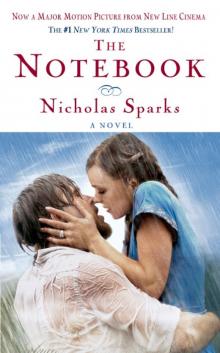 The Notebook
The Notebook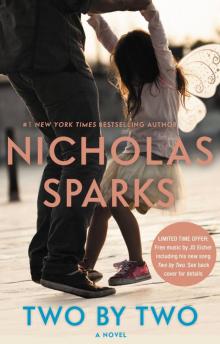 Two by Two
Two by Two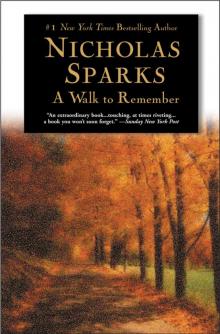 A Walk to Remember
A Walk to Remember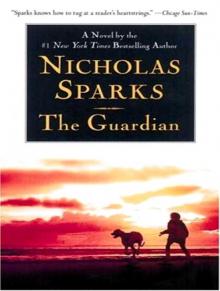 The Guardian
The Guardian Dear John
Dear John The Last Song
The Last Song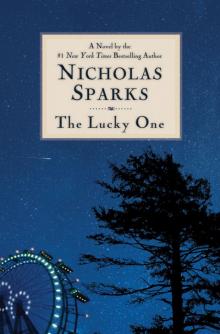 The Lucky One
The Lucky One The Wedding
The Wedding The Longest Ride
The Longest Ride Safe Haven
Safe Haven The Rescue
The Rescue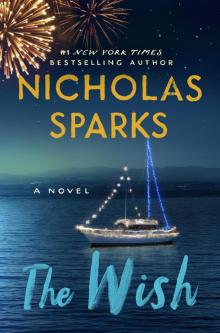 The Wish
The Wish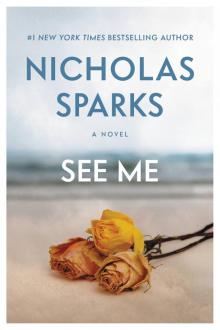 See Me
See Me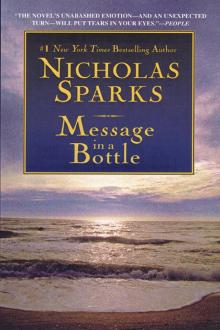 Message in a Bottle
Message in a Bottle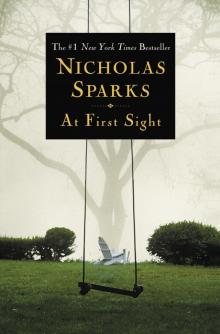 At First Sight
At First Sight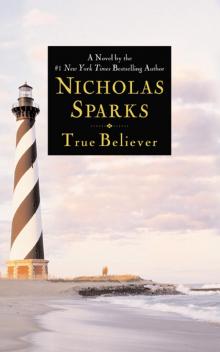 True Believer
True Believer The Return
The Return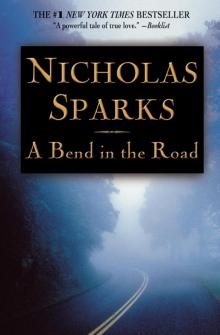 A Bend in the Road
A Bend in the Road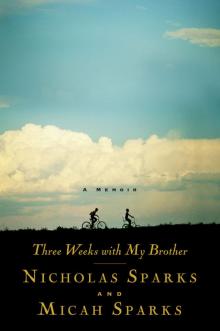 Three Weeks With My Brother
Three Weeks With My Brother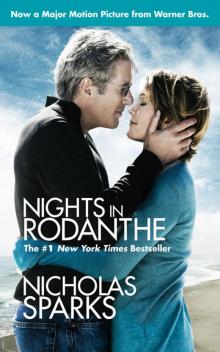 Nights in Rodanthe
Nights in Rodanthe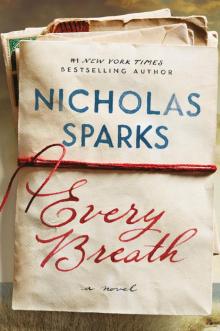 Every Breath
Every Breath